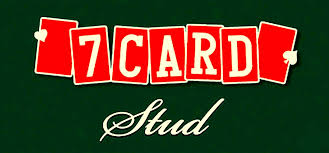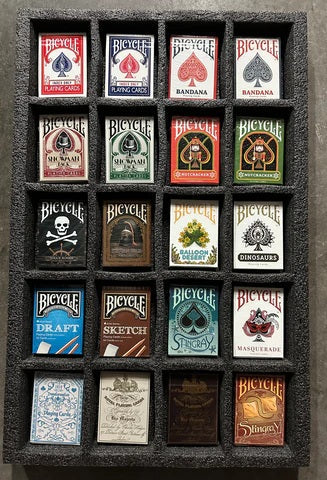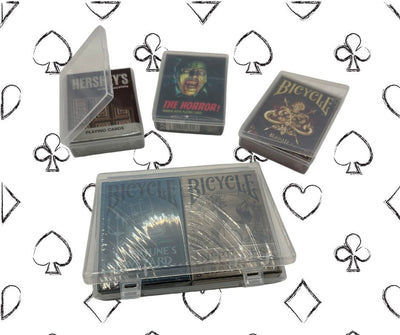(A Seven Card Stud hand at the end of the River Round)
Card Game Rules
Seven Card Stud Poker is a casino type game where the objective is to win the best hand out of a group of players. Players are initially given seven cards (hence the name). They then try to make the best 5 card hand out of the seven cards all the while betting against the other hands in play. Seven Card Stud is played with a standard 52 playing card deck with Aces high and 2’s low.
For other casino type games, see our guides for Blackjack and Texas Hold’em Poker.
If you are looking for cards to play Seven Card Stud with, check out a standard pack here or one of our more recent arrivals here.
Below is the list of hand rankings from least to greatest:
Ranking of Hands
High Card- If nobody has any pairs, the highest card wins.
One Pair
Two Pair
Three of a Kind
Straight- Five sequential cards that are not of the same suit.
Flush- Five cards that are of the same suit.
Full House- Three of a kind and a pair
Four of a Kind
Straight Flush- Five sequential cards that are of the same suit
Royal Flush- 10 through Ace of the same suit.
Set Up
To begin a game of Seven Card Stud, a dealer must first be chosen. To do so, a random player passes out cards from a shuffled deck to each person in the game. The first player to draw an Ace becomes the dealer for the round.
How to Play
The game begins by everyone placing an initial bet into the pot. For casual games, this is normally a dollar or two. Play then proceeds to the following five rounds: Round One, 4th Street, 5th Street, 6th Street, and River

(The order of play in Seven Card Stud)
Round One
The dealer then passes out two faced down cards to every player. These cards are called the “holes”. Next the dealer passes out a faced-up card to every player. This card is called the “door”. After the door is given to everyone, a round of betting occurs called the “bring-in”. The bring-in begins with the player who has the lowest valued card and proceeds clockwise to their left. Ties for the lowest valued card are broken by the suits alphabetically (e.g. the 2 of Clubs outranks the 2 of Spades). At any round of betting, players can decide to fold their hand and lose any bets they made in the pot.
4th Street
The dealer passes out a fourth card faced-up to any remaining players. A round of betting occurs starting with the player who received the highest 4th street or has the highest hand and proceeding clockwise to their left.
5th Street
The dealer passes out a fifth card faced-up to any remaining players. A round of betting occurs starting with the player who received the highest 5th street or has the highest hand and proceeding clockwise to their left.
6th Street
The dealer passes out a sixth card faced-up to any remaining players. A round of betting occurs starting with the player who received the highest 6th street or has the highest hand and proceeding clockwise to their left.
River
In the 5th rounds, the dealer passes out a seventh final card faced-down to any remaining players.
Each player then views their three faced-down cards and makes the best 5 card hand they can out of their seven cards without revealing it to the other players. A round of betting occurs starting with the player who has the highest visible hand and proceeding clockwise to their left. Once the round of betting ends, the remaining players reveal their hands and the pot goes to the player with the highest.
For additional information about the rules of Seven Card Stud, check out pagat's article here.
History
While the history of Poker is by no means definitive, many games scholars point to the French game Poque or the Persian game As-Nas as possible origins. What is definitive is that the game of Poker first became popular in the American south during the 1830’s. Throughout this time, gambling riverboats began spreading the game all across the Mississippi River and around New Orleans. At the time, con artists, called pokes by disgruntled players, would use the game to outwit rich tourist.
Originating within the American Midwest, Seven Card Stud didn’t appear until the mid-19th century. While Poker was spread by riverboats, Seven Card Stud was largely spread by the U. S. Military. After World War 2, the game was a staple at most casinos and continued in popularity until Texas Hold’em and other community card games overtook the gambling scene in the 1980’s.
For more information about the history of Seven Card Stud, check out this article here. If you are interested in the wider historical narrative of poker in general, check out David Parlett's article here.
Variations
Seven Card High and Low
In High and Low, all general rules from basic Seven Card Stud apply except that at showdown players make two hands out of their seven cards, one high hand and one low hand. The pot is split between the highest and lowest hand. If the pot cannot be split evenly, the odd chip goes to the winner of the highest hand.
Razz
Razz is a lowball poker variant of Seven Card Stud. All general rules from basic Seven Card Stud apply except that the objective is to have the lowest hand at the end of the game. In lowball poker, straights, flushes, and suits are irrelevant. The ranking of lowball hands are as follows:
A, 2, 3, 4, 5
A, 2, 3, 4, 6
A, 2, 3, 5, 6
A, 2, 4, 5, 6
A, 3, 4, 5, 6
2, 3, 4, 5, 6
A, 2, 3, 4, 7
A, 2, 3, 5, 7
A, 2, 4, 5, 7
A, 3, 4, 5, 7
Baseball Poker
In Baseball Poker, 3s and 9s are wild. Additionally, if a player is given a 4, they receive another card. These rules allow for a possible five of a kind, a suit that trumps a royal flush. The game selects these cards due to their relevance to the game Baseball: three strikes, four balls, and nine innings.
Let it Ride
Let it Ride has many of the same rules as classic Seven Card Stud, with two main differences: Players may reduce their wager and gameplay stops on 5th street. Players can choose to reduce their wager by 1/3 after they are given their initial 2 cards and after the first community card is dealt. Let it Ride also has set payouts as listed below
A royal flush pays 1,000 to 1. A straight flush pays 200 to 1.A four of a kind pays 50 to 1. A full house pays 11 to 1. A flush pays 8 to 1. A straight pays 5 to 1. A three of a kind pays 3 to 1. A two pair pays 2 to 1. A pair of 10s or better pays 1 to 1.
Blind Man's Bluff
In Blind Man's Bluff, one of the hole cards is placed on the forehead on the players. This means everyone can see one hole card for each player except their own. A more casual version of this game is that players simply have one card on their forehead and they bet on who has the highest card. Suit rankings are determined with each game.
Anaconda
In Anaconda, cards are not passed out in sequence. Instead, every player is given 7 cards are the start of the game. They then pass three cards to the player to their left. A round of betting the occurs. Players then pass two cards to the left. A round of betting occurs. Players then pass one card to their left and a final round of betting occurs. As always best hand wins.
Cincinnati Poker
In Cincinnati Poker, five hole cards are dealt each player instead of two.
Interview with Inside the Casino
John Nielsen from Inside the Casino interviewed us during the summer of 2018. They know all about casino games and equipment and we were happy to talk with them about the playing card industry. You may view the interview here.
Looking for more card games to play? Check out this article:
40+ Great Card Games For All Occasions
About the author: John Taylor is a content writer and freelancer through the company Upwork.com. You may view his freelancing profile here. He has a B. A. in English, with a specialty in technical writing, from Texas A&M University and a M. A. in English from the University of Glasgow. You may view his previous articles about card games here and his LinkedIn profile here.







3 comments
GOOD GAME
we were playing 7 card poker. All the cards were dealt for the last hand. One player picked up all his cards, 3 down and 4 up and put them all together facing him to review them. He then put all the cards down on the table face down and said nothing. We ruled that he folded while he contends that his cards, all face down, were still in play. What would your decision be in that case. Thanks Greg
Is a player penalized for turning up their hole cards prematurely?